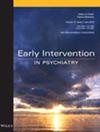Barriers and Facilitators to Motivation for Work and School in First Episode Psychosis: A Qualitative Exploration
Abstract
Aim
Decreased motivation has been found to be the strongest predictor of poor work or school functioning among individuals with psychosis. Since motivation decreases immediately following onset of psychosis, it may be an ideal potential target for intervention. The aim of this study was to explore the specific barriers and facilitators to motivation through experiences of those living with first episode psychosis.
Method
A total of 40 individuals recently diagnosed with psychosis and receiving treatment within a coordinated specialty care program completed a semi-structured qualitative interview. Audio recordings were transcribed and independently coded by three reviewers.
Results
Themes emerged regarding barriers to work and school motivation, such as challenging mental health symptoms, discouragement resulting from negative perceptions/experiences, mental health treatment/side effects, uncertainty about the future, pressure of expectations from others, financial and legal concerns, and fear of symptom recurrence. Similarly, participants described several motivational facilitators for work and school including the opinions of others, financial needs and desires, career aspirations, beneficial mental health treatment, positive attitudes about mental illness, desire for autonomy and desire for meaning in daily life.
Discussion
Better understanding of the factors that drive motivation for work and school among those with first episode psychosis may facilitate identification of ways to optimise existing treatments and/or develop more targeted approaches.

 求助内容:
求助内容: 应助结果提醒方式:
应助结果提醒方式:


